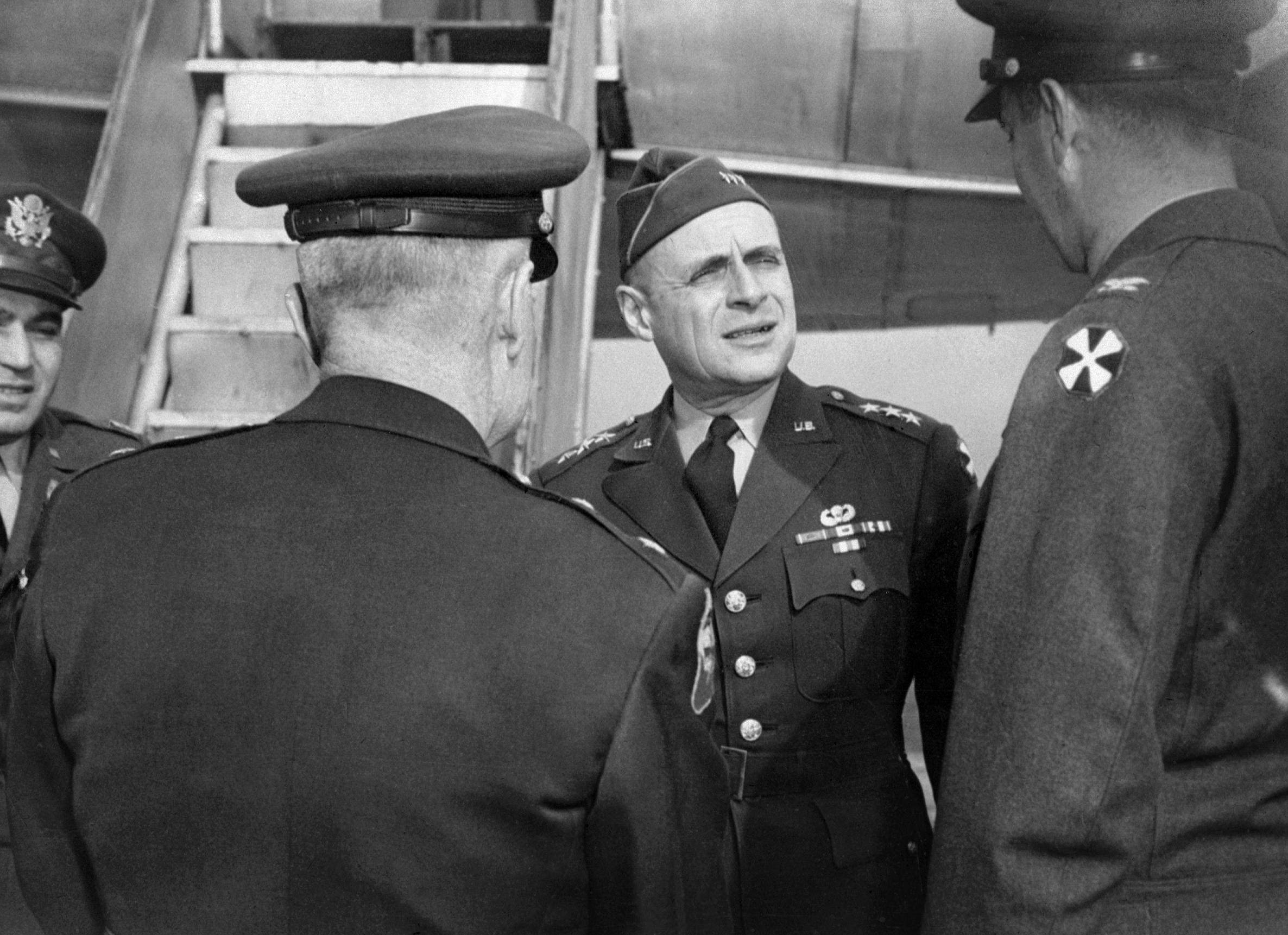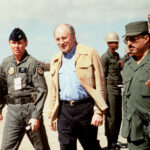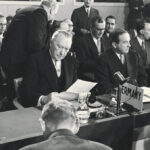
- (DUSTY%20SHELVES)\%22>&url=https%3A%2F%2Fwarroom.armywarcollege.edu%2Fpodcasts%2Fridgways-memo-dusty-shelves-1%2F&hashtags=WAR_ROOM" title="Share on Twitter" onclick="essb.window('https://x.com/intent/post?text=(DUSTY%20SHELVES)\%22>(DUSTY%20SHELVES)\%22>&url=https%3A%2F%2Fwarroom.armywarcollege.edu%2Fpodcasts%2Fridgways-memo-dusty-shelves-1%2F&hashtags=WAR_ROOM','twitter','1950625983'); return false;" target="_blank" rel="noreferrer noopener nofollow" class="nolightbox essb-s-bg-twitter essb-s-bgh-twitter essb-s-c-light essb-s-hover-effect essb-s-bg-network essb-s-bgh-network" >
Lieutenant General Matthew B. Ridgway assumed command of Eighth U.S. Army after it had been driven south in the early phases of the Korean War. Faced with a broken and dispirited force, Ridgway had to turn the situation around quickly. His memorandum of January 1951, “Why We Are Here,” was a message to the troops about what was at stake, and embodied his belief in the cause and faith in the fighting spirit of the force. In six months, a rejuvenated Eighth U.S. Army had driven the Chinese north of the 38th parallel. It is one of the great stories of U.S. military history.
This inaugural episode of the Dusty Shelves series, Army historian Con Crane and War Room podcast editor Jacqueline E. Whitt present the memorandum and the story of Lieutenant General Ridgway. The memorandum, displayed and transcribed below, comes from the collection of Ridgway’s papers available at the Army Heritage and Education Center.
It is an example of transformational leadership at the tactical, operational, and strategic level that has a major impact on a major conflict.
Podcast: Download
Subscribe: Apple Podcasts | Spotify | Amazon Music | Android | Pandora | iHeartRadio | Blubrry | Podchaser | Podcast Index | TuneIn | Deezer | Youtube Music | RSS | Subscribe to A Better Peace: The War Room Podcast
LEARN MORE ABOUT THE “DUSTY SHELVES” SERIES
Con Crane is a military historian with the Army Heritage and Education Center and associated editor of War Room. Jacqueline E. Whitt is Professor of Strategy at the U.S. Army War College. The views expressed in the podcast are those of the speakers and do not necessarily reflect those of the U.S. Army War College, U.S. Army, or the Department of Defense.
Photo: American General Matthew Ridgway commanding the 8th Army talks to US officers before his departure to the Korean front line 05 January 1951 in Seoul.
Photo Credit: AFP/Getty Images
Posts in the “Dusty Shelves” series:
- CARTER’S FAILED STRATEGIC GAMBLE: GENERAL HUYSER’S MISSION TO TEHRAN
(DUSTY SHELVES) - KOREA ON THE BRINK: GENERAL JOHN WICKHAM AND POLITICO-MILITARY CRISIS MANAGEMENT
(DUSTY SHELVES) - FIGHTING BY MINUTES, THIRTY YEARS LATER
(DUSTY SHELVES) - THE ARMED FORCES OFFICER (1988): THE FORGOTTEN PRIMER ON LEADERSHIP
(DUSTY SHELVES) - RIDGWAY’S KOREAN WAR
(DUSTY SHELVES) - ALL WAR IS LOCAL: ANTHONY QUAYLE’S EIGHT HOURS FROM ENGLAND
- POST-WAR TRUTH TELLING: THE WAR MANAGERS
- DYE: EXALTING THE TAIL OF THE AIRPOWER TOOTH
(DUSTY SHELVES) - PEACE FORMS: LOOKING BACK TO THE FUTURE OF WAR AND ANTI-WAR
- SHERMAN: THE OUTLIER OF INTERWAR “ATLANTIC” AIR THEORY?
(DUSTY SHELVES)
- (DUSTY%20SHELVES)\%22>&url=https%3A%2F%2Fwarroom.armywarcollege.edu%2Fpodcasts%2Fridgways-memo-dusty-shelves-1%2F&hashtags=WAR_ROOM" title="Share on Twitter" onclick="essb.window('https://x.com/intent/post?text=(DUSTY%20SHELVES)\%22>(DUSTY%20SHELVES)\%22>&url=https%3A%2F%2Fwarroom.armywarcollege.edu%2Fpodcasts%2Fridgways-memo-dusty-shelves-1%2F&hashtags=WAR_ROOM','twitter','1290185539'); return false;" target="_blank" rel="noreferrer noopener nofollow" class="nolightbox essb-s-bg-twitter essb-s-bgh-twitter essb-s-c-light essb-s-hover-effect essb-s-bg-network essb-s-bgh-network" >





Thank you for sharing this view of General Ridgeway and his leadership. Why does the Army not instill this type of leadership within the profession?